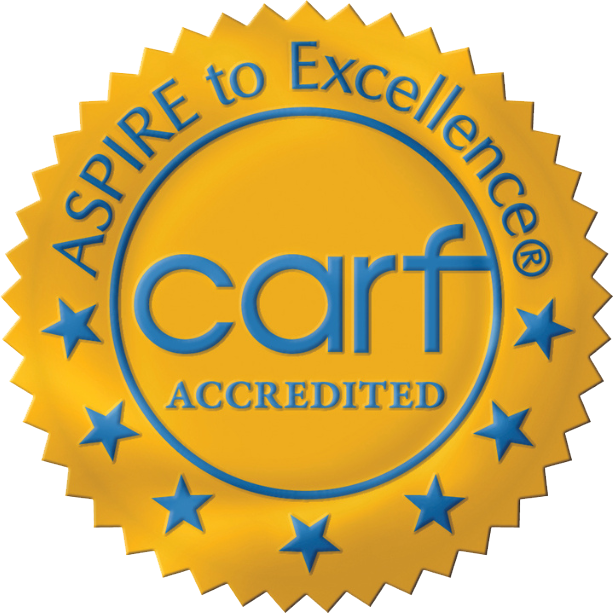The potential for traumatic brain injury (TBI) patients to achieve full recovery is a complex and individualized matter. While every TBI case is unique, it is essential to acknowledge that some individuals have achieved remarkable recoveries.
In this article, we will delve into the intriguing question, “Can TBI patients fully recover?” and uncover the possibilities, treatment options, and strategies to boost the rehabilitation process.
How long does it take to recover from a Traumatic Brain Injury?
While it is challenging to provide a specific length of time for brain trauma recovery due to the individual nature of each case, it is generally understood that recovery is a gradual and ongoing process that can span months to years.
The timeline can vary based on factors such as the severity of the injury, the individual’s overall health, and the effectiveness of treatment and rehabilitation.
- For mild brain injuries, recovery is often shorter, with symptoms improving within weeks to a few months.
- Moderate to severe TBIs typically require a more extended recovery period. In these cases, the acute stage may last a few weeks, followed by a subacute stage spanning several months. It’s important to note that significant progress is often observed within the first six months of recovery, but improvement can continue beyond that time frame.
- The long-term recovery stage can extend for years, during which the individual may continue to progress in physical, cognitive, and emotional functioning. However, it’s essential to recognize that complete recovery may not always be achievable, especially in cases of severe traumatic brain injury where permanent impairments may remain.
Can TBI patients fully recover?
It’s important to note that complete recovery from severe traumatic brain injury may not always be possible. However, many individuals with mild to moderate neurotrauma can experience significant improvements over time. The brain has the remarkable ability to reorganize and adapt, allowing for functional recovery and compensatory strategies.
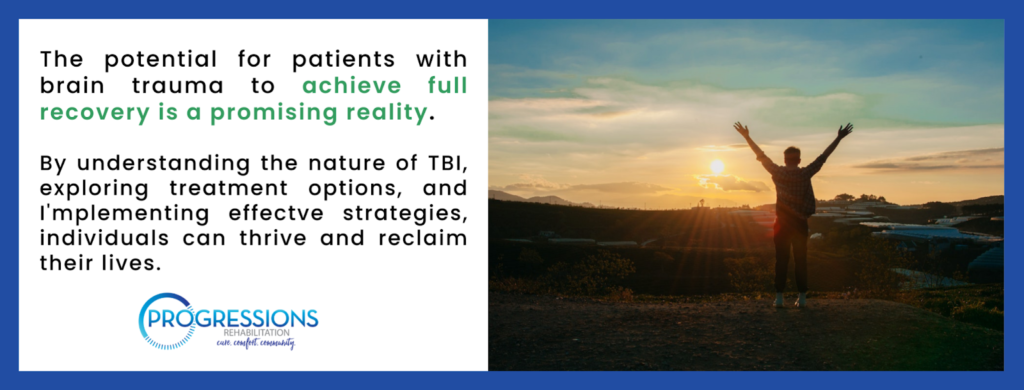
The duration of brain trauma recovery is highly individualized, and it’s important to have realistic expectations. Patience, consistency in rehabilitation efforts, and a supportive environment can contribute to optimizing the recovery process.
What role does rehabilitation play in TBI recovery?
Rehabilitation plays a vital role in the recovery process for traumatic brain injury patients. It is a comprehensive and multidisciplinary approach aimed at maximizing functional abilities, promoting independence, and improving the overall quality of life.
Rehabilitative interventions are tailored to address the specific impairments and challenges faced by individuals with brain trauma. Here are the key roles that rehabilitation plays in TBI recovery:
Restoring physical functioning
Brain injury can result in physical impairments such as muscle weakness, balance problems, and coordination difficulties.
Physical therapy focuses on improving strength, mobility, and coordination through exercises, therapeutic activities, and assistive devices. This helps individuals regain physical abilities and optimize their independence in daily activities.
Enhancing cognitive skills
TBI often affects cognitive functions such as memory, attention, problem-solving, and information processing. Cognitive rehabilitation involves techniques and exercises designed to improve cognitive skills and compensatory strategies to manage any remaining challenges. This can include memory exercises, attention training, and plans to enhance mental efficiency.
Improving communication and language abilities
Language and communication difficulties are common after brain damage. Speech and language therapy helps individuals regain or improve their speech production, comprehension, and language skills. Techniques such as speech exercises, communication strategies, and alternative communication methods may be employed.
Addressing emotional and psychological well-being
TBI can significantly impact emotional and psychological well-being, leading to mood swings, depression, anxiety, and adjustment difficulties. Psychologists or neuropsychologists provide counseling, psychotherapy, and behavioral interventions to support emotional healing, improve coping mechanisms, and enhance overall psychological well-being.
Social and vocational rehabilitation
Head injury can impact social relationships, social skills, and the ability to return to work or school. Social rehabilitation programs focus on rebuilding social skills, promoting community integration, and providing support in transitioning back to work or school.
Vocational rehabilitation helps individuals regain employment skills, explore career options, and facilitate a successful return to work.
Rehabilitation also includes ongoing monitoring of progress, reassessment of treatment goals, and making necessary adjustments to the rehabilitation plan as the individual’s needs evolve throughout the recovery process.
By providing comprehensive care and support, rehabilitation helps individuals with TBI maximize their functional potential, regain independence, and improve their overall quality of life.
How can you boost the recovery process in traumatic brain injury?
Boosting the recovery process in traumatic brain injury involves a comprehensive approach encompassing various factors. While each individual’s recovery journey is unique, here are some strategies that can help facilitate and enhance the recovery process:
Early and appropriate medical care
Seek immediate medical attention after a head trauma to ensure proper diagnosis and treatment. Timely medical interventions can help prevent further damage and promote the brain’s healing process.
Follow rehabilitation recommendations
Engage in a structured and personalized rehabilitation program that may include physical, occupational, speech, and cognitive therapies. Consistency and active participation in therapy sessions are crucial for maximizing recovery potential, as this can stimulate neuroplasticity.
Neuroplasticity refers to the brain’s ability to reorganize and form new neural connections in response to learning, experience, and environmental changes. It is a fundamental mechanism that underlies the brain’s capacity to adapt and recover after injury.
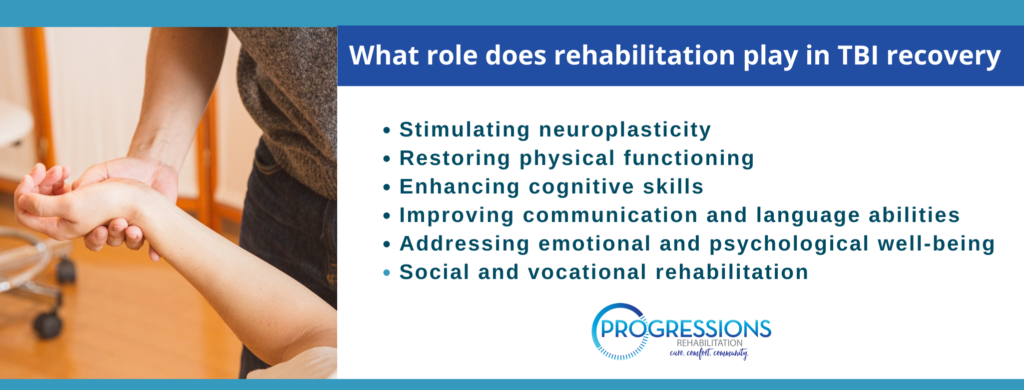
Rehabilitation exercises are designed to stimulate and activate specific neural pathways and networks associated with motor, cognitive, and sensory functions. By engaging in targeted and repetitive activities, individuals with brain injury can enhance neuroplasticity through the following mechanisms:
- Synaptic plasticity
- Neurogenesis
- Functional reorganization
- Sensory stimulation
- Skill acquisition and learning
It’s important to note that the intensity, frequency, and specificity of rehabilitation exercises can influence the degree of neuroplastic changes. Consistent and challenging exercises that target specific functional goals are typically more effective in promoting neuroplasticity and improving recovery outcomes.
Healthy lifestyle choices
Adopt a healthy lifestyle to support brain health and recovery. This includes regular exercise, a balanced diet rich in nutrients, adequate sleep, and avoiding harmful substances like alcohol and drugs. Consult with healthcare professionals to determine appropriate exercise levels and dietary recommendations.
Cognitive stimulation
Engage in activities that stimulate cognitive function and mental acuity. This can include puzzles, reading, writing, playing musical instruments, or engaging in hobbies that require problem-solving and memory recall. Apps and computer-based programs designed for cognitive training may also be beneficial.
Emotional support and counseling
Emotional well-being is a crucial part of the recovery process. Seek emotional support from loved ones, support groups, mental health counselors, and psychologists. Consider individual or group counseling to address any emotional challenges and develop effective coping strategies.
Assistive devices and technology
Explore the use of assistive devices and technology that can aid in daily activities and compensate for any remaining impairments. Examples include mobility aids, communication devices, memory aids, and smartphone applications designed for individuals with cognitive difficulties.
Gradual return to activities
Gradually reintegrate into activities of daily living, work, school, or social engagements as deemed appropriate by healthcare professionals. Start with manageable tasks and progressively increase the complexity and duration to avoid overwhelming the recovering brain.
Supportive environment
Create a supportive and understanding environment that promotes patience, empathy, and encouragement. Involve family members and caregivers in the recovery process to ensure consistent support and assistance.
Regular follow-up with healthcare professionals
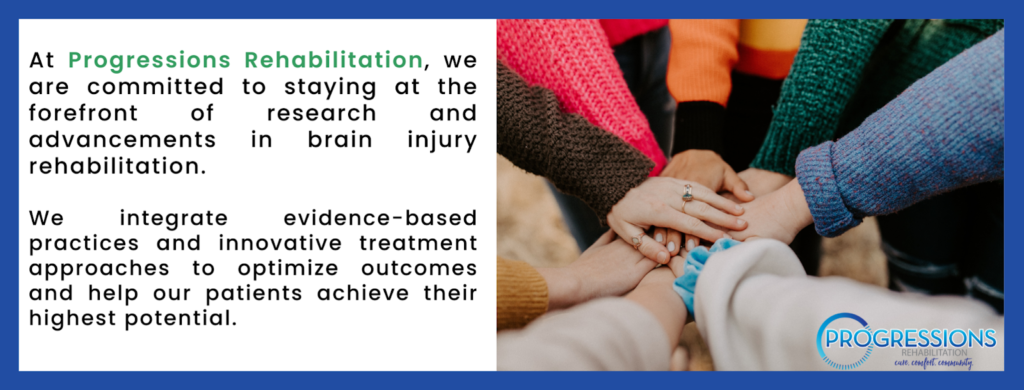
Maintain regular follow-up appointments with healthcare professionals involved in your care. They can monitor your progress, assess any emerging needs, and make necessary adjustments to your treatment plan.
Where to find the best neuro rehabilitation in Michigan?
The potential for patients with brain trauma to achieve full recovery is a promising reality. By understanding the nature of TBI, exploring treatment options, and implementing effective strategies, individuals can thrive and reclaim their lives.
That’s why at Progressions Rehabilitation, we are committed to staying at the forefront of research and advancements in brain injury rehabilitation. We integrate evidence-based practices and innovative treatment approaches to optimize outcomes and help our patients achieve their highest potential.
Our multidisciplinary team specializes in providing various services and programs, such as the following:
- Group homes for brain injury patients
- Group homes for spinal cord injury
- Assisted living for brain injury
- Neurologic rehabilitation
- Post-acute brain injury rehab
Take the Next Step toward Recovery!
Don’t let a brain injury define your potential. Trust the expertise of Progressions Rehab to guide you or your loved one toward a brighter future. Contact us today to schedule a consultation or learn more about our comprehensive brain injury rehabilitation programs.
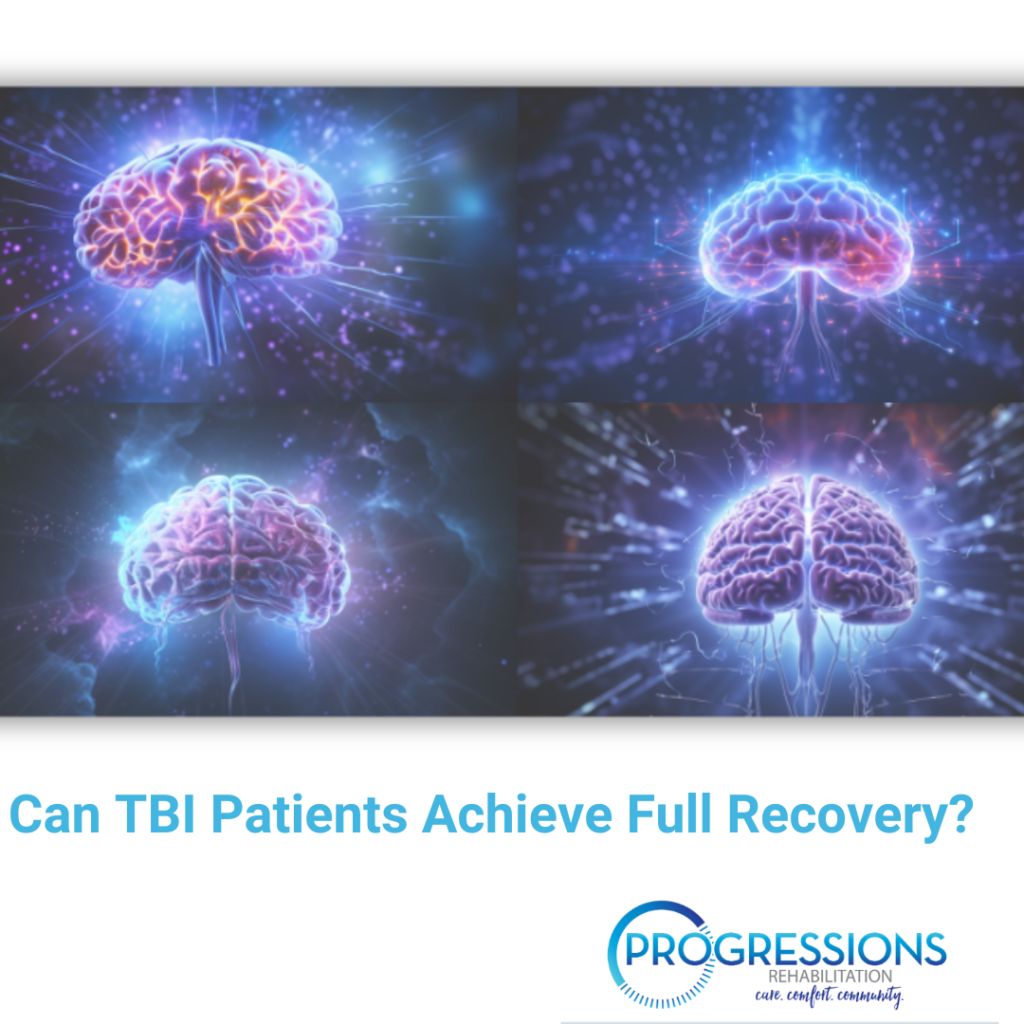
The material contained on this site is for informational purposes only and DOES NOT CONSTITUTE THE PROVIDING OF MEDICAL ADVICE, and is not intended to be a substitute for independent professional medical judgment, advice, diagnosis, or treatment. Always seek the advice of your physician or other qualified healthcare providers with any questions or concerns you may have regarding your health.


